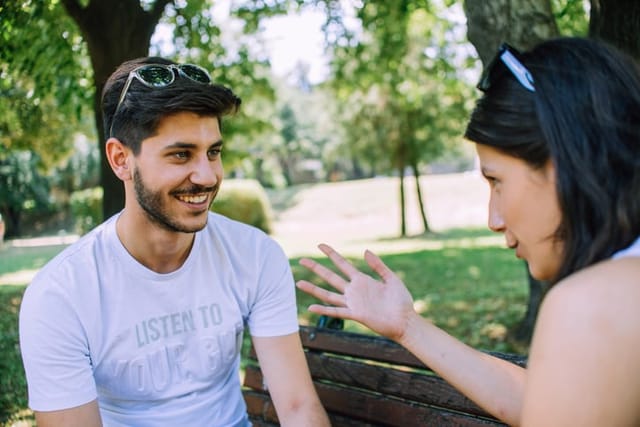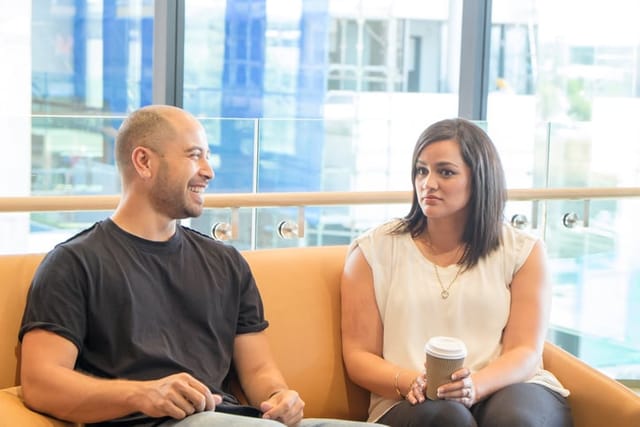When you’ve done something wrong or hurt someone you care about, it’s natural to want to make amends and get back on track with them as soon as possible. That starts with a genuine apology in which you acknowledge that you messed up, say sorry for the effect your actions had on the other person, and vow to do better in the future. However, not all apologies are created equal, and there are certain things you shouldn’t do and say when trying to earn someone’s forgiveness.
1. You’re sorry, “but…”

When you say “sorry” and then add a “but,” it’s like you’re taking back the apology as soon as you’ve made it. Stick to the apology itself without attaching reasons or excuses that might weaken its impact. Keep the focus on acknowledging the mistake and expressing regret, not on trying to soften the blow of your own actions.
2. You make it all about you.
Remember, the focus of your apology should be on the person you’ve wronged, not on your own feelings of guilt or regret. By prioritizing their feelings and the impact your actions have had, you demonstrate a genuine understanding and concern for their the other person. It doesn’t matter how you feel right now — it’s all about them.
3. You try to rush forgiveness.

Even if you’re genuinely sorry, you can’t force someone to accept your apology and move on right away, especially if you’ve done something particularly awful. It’s something that the other person needs to come to in their own time (if at all). Giving them the space to process their feelings shows that you actually respect them and proves that you’re aware of how harmful what you did really was. Otherwise, you don’t actually seem very sincere.
4. You’re too vague.

Vague apologies can come across as insincere because they keep you from owning up to specific behaviors or the actual pain you caused the other person. As much as it sucks to revisit, providing details in your apology shows that you’re not just saying you’re sorry — you’ve actually reflected on your actions and you’re serious about wanting to make it up to them.
5. You do it in public.

Public apologies for private issues can make the situation worse because they end up drawing unwanted attention. Talking to them when you’re one-on-one ensures that your apology is intimate and focused, and it reinforces your intent to mend the relationship. Other people do not need to be pulled into your drama!
6. You over-apologize for stuff that’s not a big deal.

Constantly apologizing for minor stuff ends up totally negating the meaning of your apologies, so it’s important to be able to discern when a sincere apology is actually warranted. Doing this helps maintain the integrity and impact of your words when it truly matters.
7. You send your “sorry”s via text.

Delivering your apology in person adds a level of sincerity and accountability that can’t be matched in text. As tough as it might be to face someone you’ve wronged, doing so makes it more likely that you’ll be forgiven since the other person will be able to look you in the eye and see that you’re being genuine. They’ll also respect that you had the courage to face them.
8. You have hidden motives.

An apology should be a genuine expression of remorse, free from any ulterior motives or attempts to manipulate the situation. If you say you’re sorry in order to skew the narrative in your favor or get something you want, you’re kinda the worst. Keeping your intentions pure ensures the apology helps to real any rifts rather than to benefit yourself.
9. You don’t change your behavior after apologizing.
Following up an apology with concrete actions to change behavior is a non-negotiable here. How on earth is anyone going to believe that you’re genuinely sorry if you go straight back to the same old BS after they forgive you? Not only will making strides to change show them that you were serious, but it will also start to rebuild the trust you may have lost with them.
10. Your apologies are forced.

An apology should stem from a genuine desire to make things right, not from external pressures or obligations. When you say you’re sorry because you truly are and you hate what you’ve done to the other person, it resonates more deeply and is more likely to be accepted (and actually help you move forward).
11. Your body language is all off.
Ensuring your body language shows sincerity and remorse is key to reinforcing the message of your apology. Your words need to match your actions, and if you’re standing there with crossed arms and a sour look on your face, it’s going to be hard for the other person to take your “sorry” seriously.
12. You make lots of excuses.
Sure, it sucks to admit when you were wrong, but trying to cover it up with loads of excuses and justifications completely undermines your apology and shows that you aren’t truly taking responsibility for your actions. Leave the excuses at the door and own up to what you did 100%.
13. You put it off for as long as possible.
Addressing mistakes with an apology pretty much right away can prevent further damage and misunderstandings. It also shows that you’re self-aware enough to know when you’ve royally screwed up and that you care enough about the other person’s feelings to want to make it up to them right away.
14. You try to get it done and over with.

Investing time to articulate your apology thoughtfully shows that you value the feelings of the person you’ve wronged and are dedicated to making a sincere effort to fix the situation. If you set aside five minuets to say you’re sorry and move on, you’re clearly not genuinely interested in making amends.
15. You don’t acknowledge the hurt you caused.

It’s one thing to be sorry because someone else is upset and entirely another to ‘fess up to the fact that it was your actions that made them feel that way. You can’t give a heartfelt apology without the latter. Recognizing that it’s you who messed up helps to validate their feelings and makes your apology much more palatable.
Enjoy this piece? Give it a like and follow Bolde on MSN for more!








